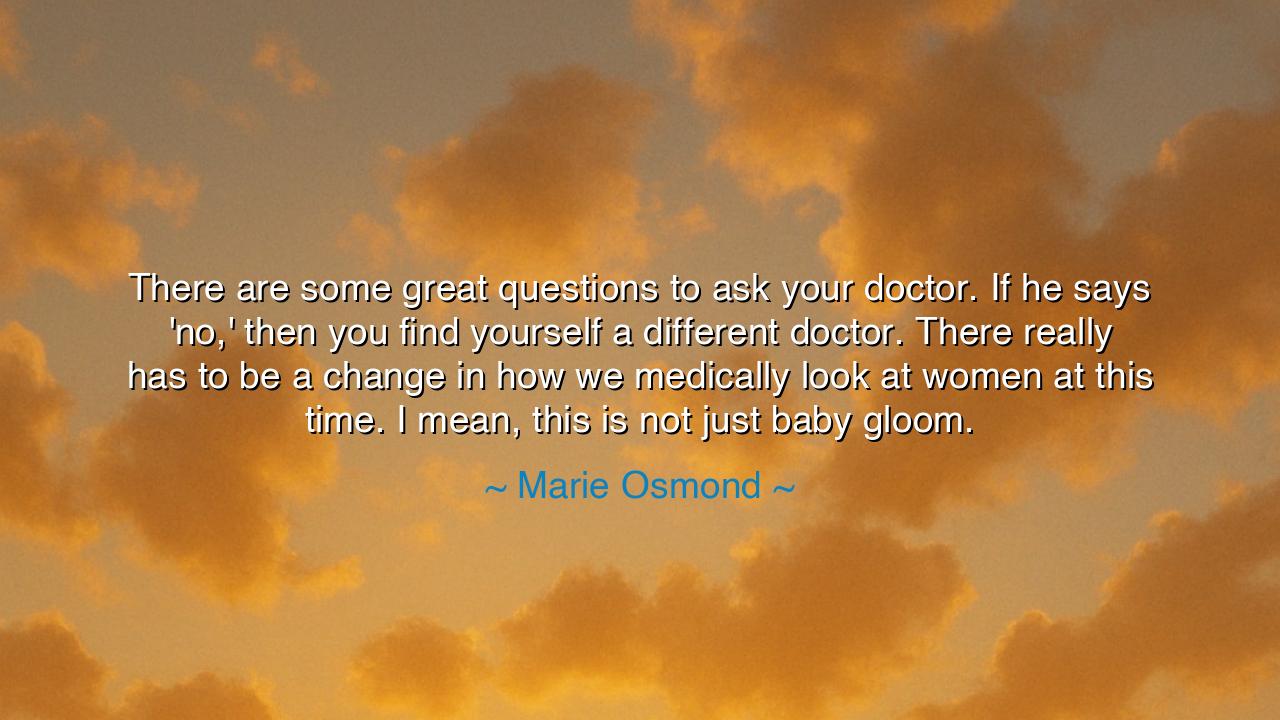
There are some great questions to ask your doctor. If he says
There are some great questions to ask your doctor. If he says 'no,' then you find yourself a different doctor. There really has to be a change in how we medically look at women at this time. I mean, this is not just baby gloom.






"There are some great questions to ask your doctor. If he says 'no,' then you find yourself a different doctor. There really has to be a change in how we medically look at women at this time. I mean, this is not just baby gloom." These words from Marie Osmond challenge us to confront the deep-seated issues within the medical treatment of women, particularly in relation to the healthcare system and the understanding of women's health. Osmond’s statement is not merely about asking the right questions of a doctor; it is about demanding that women’s voices and experiences are acknowledged and respected in the medical field. It speaks to the need for empowerment and accountability—for women to seek out care that aligns with their well-being and for doctors to offer that care with a deeper respect and understanding of women’s unique health needs.
In the ancient world, women’s health was often neglected, misunderstood, or even disregarded by medical practitioners. The Greeks had limited understanding of the female body, and many female ailments were attributed to humors or emotions rather than being seen as physiological concerns. Hippocrates, the father of modern medicine, laid down many ethical principles for physicians, yet his work, like many ancient texts, often treated women’s bodies as mysterious or even problematic. In a society where women’s voices were muted, it was difficult for women to advocate for their own health. The ancient Egyptians, however, had slightly more progressive views on women’s health, with female practitioners like Peseshet, who is believed to have been one of the first women in history to be trained as a physician. Her presence in medical history symbolizes the possibility of empowerment, even in the face of systemic barriers.
The story of Hippocrates himself offers us a lens into the evolution of medicine. While his contributions to the medical field were monumental, it is important to acknowledge that his understanding of female health was rudimentary at best. His influence endured for centuries, shaping medical practice and the treatment of women in ways that were often paternalistic and dismissive. The ancient medical establishment was largely male-dominated, with women’s healthcare often relegated to midwives or home remedies. While progress has been made, Marie Osmond’s words remind us that much of this historical neglect continues to ripple through modern medicine. The emotional and physiological complexities of women’s health are often still underrepresented in research, treatment, and medical education, leading to misunderstandings and oversights that perpetuate gender bias in healthcare.
In the 19th and early 20th centuries, women’s health was still often minimized, with treatments for mental health conditions like postpartum depression dismissed as hysteria or baby blues—the very term “baby gloom” that Osmond mentions. Many women, especially in the West, were prescribed sedatives or subjected to institutionalization rather than being taken seriously by doctors. The suffrage movement and the rise of feminism in the 20th century began to challenge this, with women demanding that their voices be heard and that their healthcare be treated with the seriousness it deserved. One prominent figure during this shift was Mary Putnam Jacobi, a physician who fought for the legitimacy of female health issues and sought to challenge the medical establishment’s perceptions of women’s bodies. Her advocacy helped create a foundation for better understanding of female physiology and the need for equitable healthcare.
Osmond’s call for a change in how we “medically look at women” reflects the ongoing battle for gender equity in healthcare. It is a direct challenge to the continued dismissal or over-simplification of women’s health issues. Women are often expected to endure pain, to accept imbalances in treatment, or to sacrifice their needs for the sake of family or work, all while being told to stay quiet. In modern times, the struggle for women’s healthcare rights has led to significant victories, but the road ahead remains long. The fight for reproductive rights, the need for more research on women’s diseases, and the continuing challenges women face in maternal care are just a few of the issues at hand. It is only when women demand to be heard, as Osmond advocates, that true progress will be made in medicine.
The lesson we take from Marie Osmond’s words is that women’s health should no longer be overlooked, minimized, or misunderstood. Every woman has the right to access quality healthcare that addresses her unique needs—from reproductive health to mental well-being. It is not just about asking the right questions of a doctor, but about holding the medical system accountable to respect and prioritize women’s health. If doctors refuse to provide the necessary care, Osmond’s challenge is clear: seek another provider who will.
In our own lives, whether we are patients, doctors, or advocates, we must remember to empower women in their healthcare decisions. We must not only ask questions but demand that women’s voices are taken seriously and their health concerns treated with the respect and care they deserve. This is not just a matter of improving medical care—it is about ensuring that all people, especially women, have access to the same quality of care and understanding that has been historically withheld. By doing so, we contribute to a more just and equitable healthcare system—one that listens, cares, and acts in the best interests of every individual.






AAdministratorAdministrator
Welcome, honored guests. Please leave a comment, we will respond soon